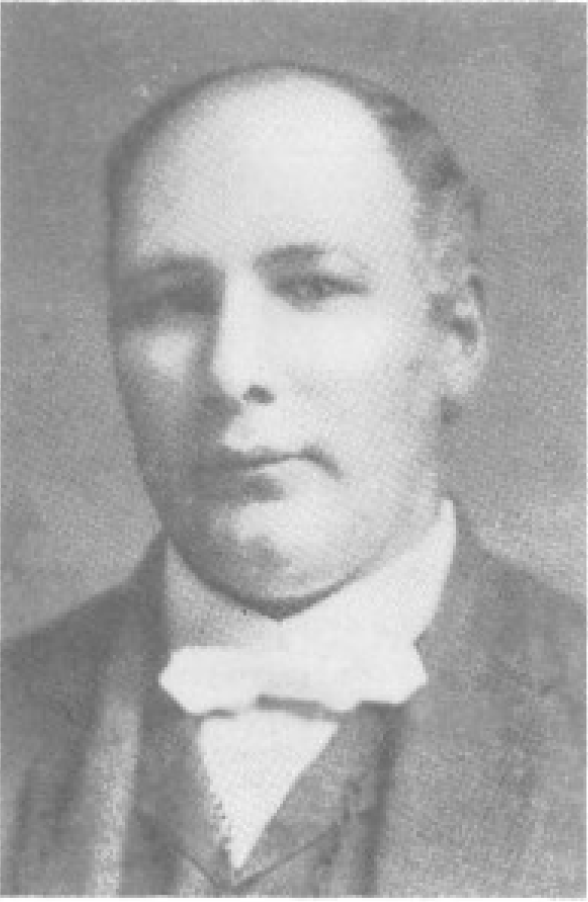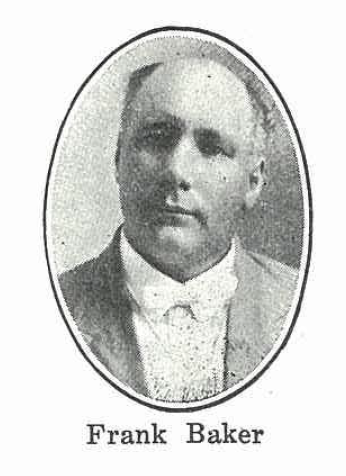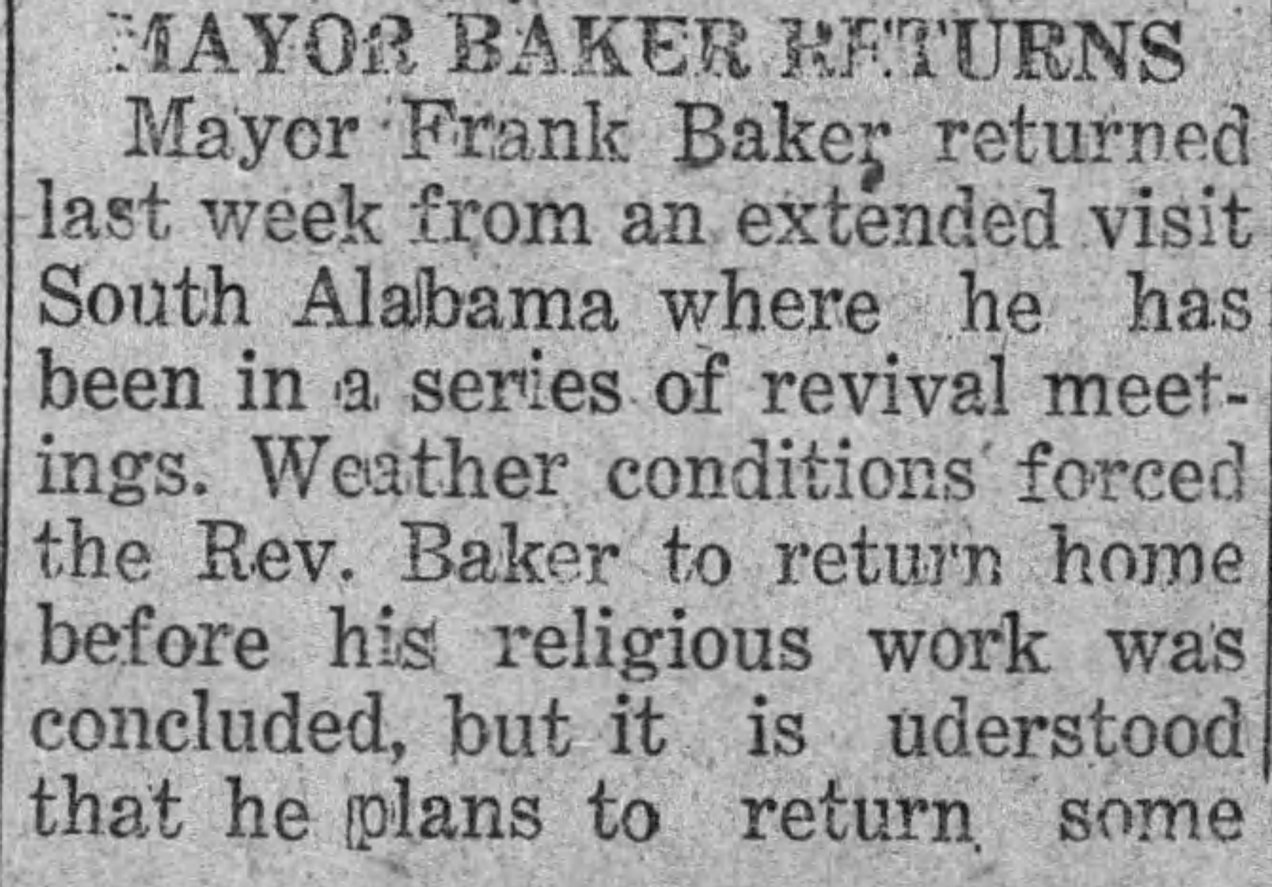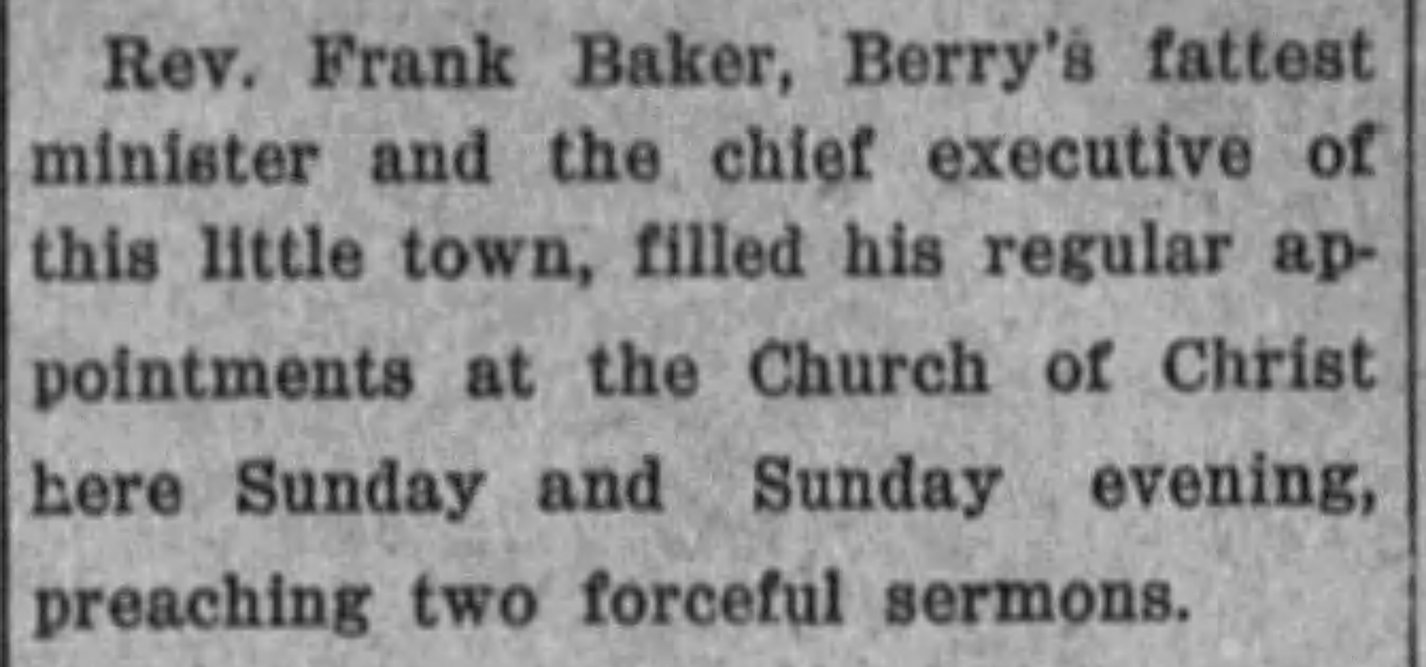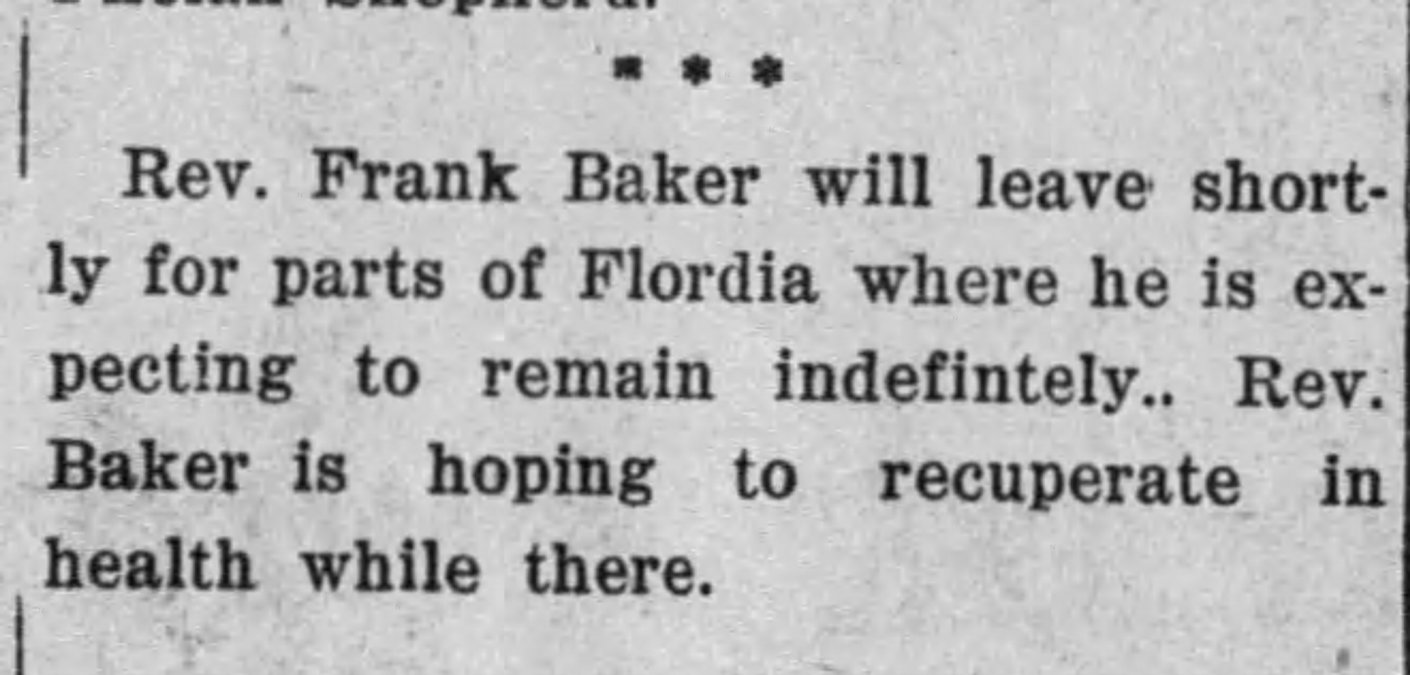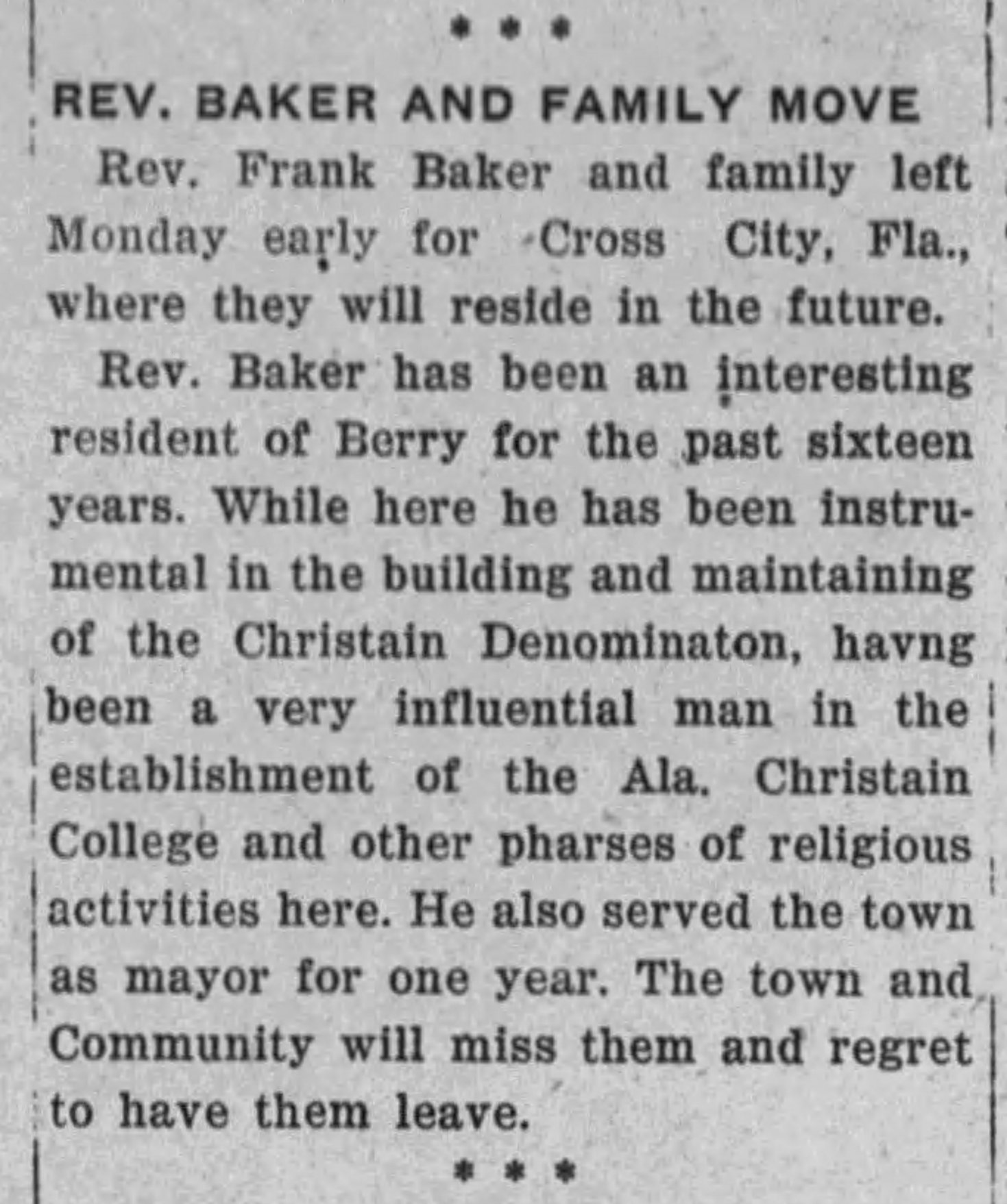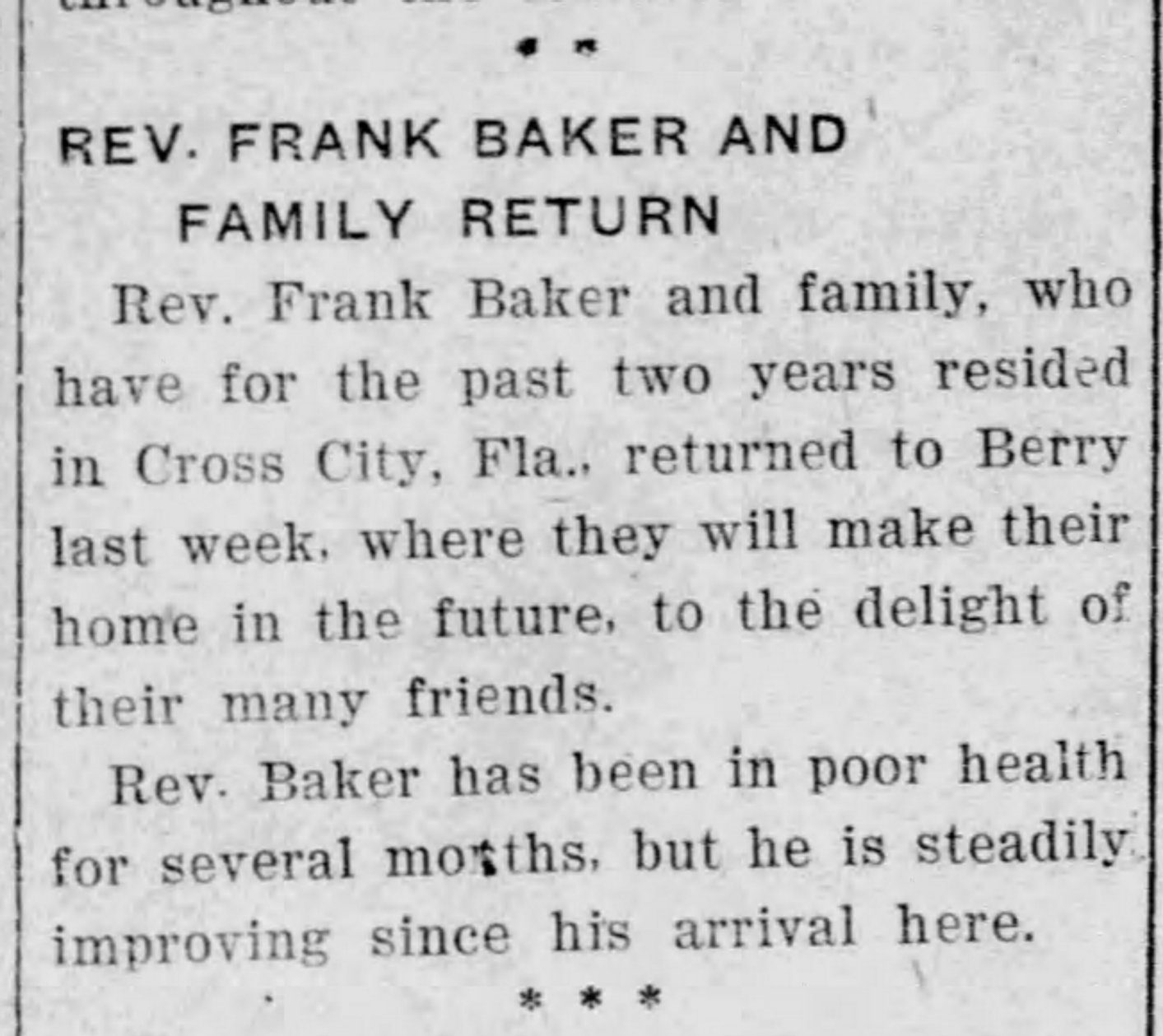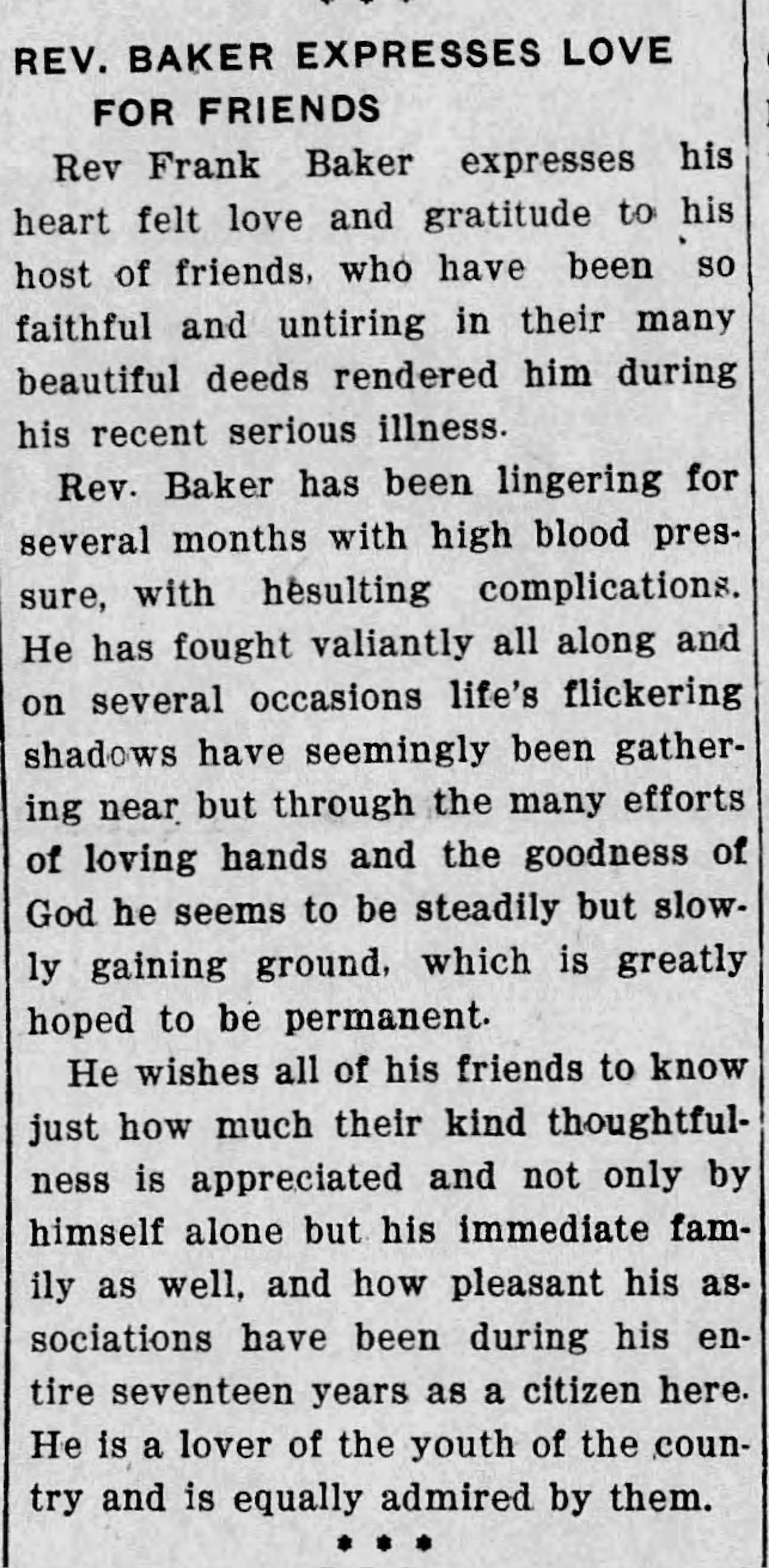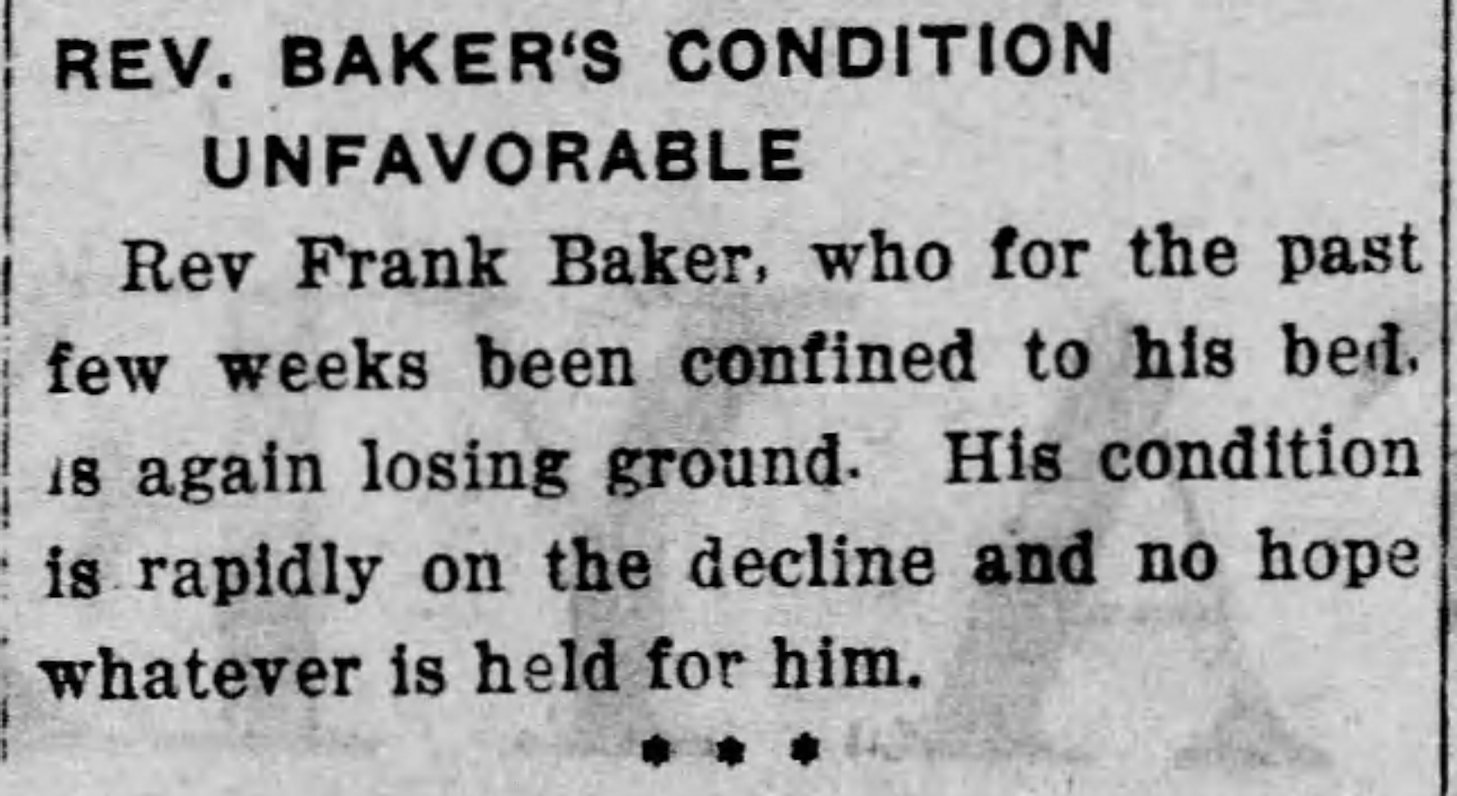Charles Franklin "Frank" Baker
1868-1928
![]()
The Life Of Frank Baker
Charles Franklin Baker was born September 12, 1868 in Missouri. He was the son of Robert F. "Surly Bob" Baker (1824-1884) of Estill, Kentucky and Elizabeth Jane "Eliza" Couch (1823-1900) of Tennessee. He had one older brother, James Washington Baker (1845-1923). Frank was married to Sarah Lela Eubanks (1880-1954) on October 13th, 1898 in Village, Columbia County, Arkansas. They had five children, Algie Baker (1899-1959); Nay Hamilton Baker (1902-1967); Horace Samuel Baker (1904-1966); Bert Ulmer Baker (1911-1966); and Eunice Estelle Baker (1919-2007).
Frank's father passed away when a young teen of sixteen. However, until that time his parents had been "devoted members of the Baptist church." (Boyd E. Morgan, Arkansas Angels, p.57)
"At the age of twenty, Frank obeyed the gospel under the preaching of J. S. Davis, in Washington County, Arkansas. In the winter following through the influence of J. A. Rose, he entered school at Eros, Arkansas. For one year he was a hard student in this school and then for three years prosecuted his studies in the school of Valley Springs. After his school days he taught two years in public schools, meanwhile taking an active part in the public work of the church. In 1898 he began to devote all his time to preaching the Word." (C.R. Nichol, Gospel Preachers Who Blazed The Trail, p.10)
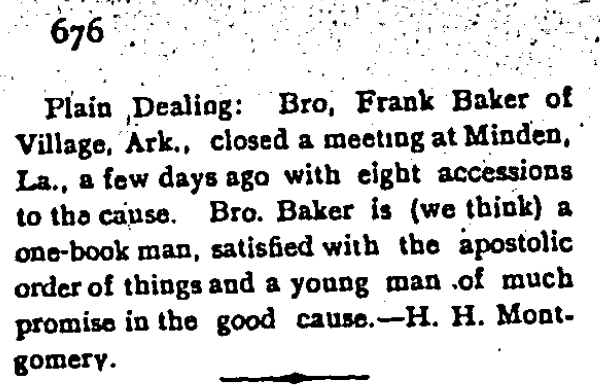
Firm Foundation-1899-10-03-p.642
After getting married that same year, he and his new family were invited by the Union Grove church of Christ in Lincoln, Louisiana to move there and begin preaching in 1900. When they announced his coming they reported, "He is not a salaried preacher, but he is going to preach and we are going to try and support him. He has three regular monthly appointments, and the rest of his time he will preach at destitute places. (Fannie Ball, GA, 1899-12-21-p.816)
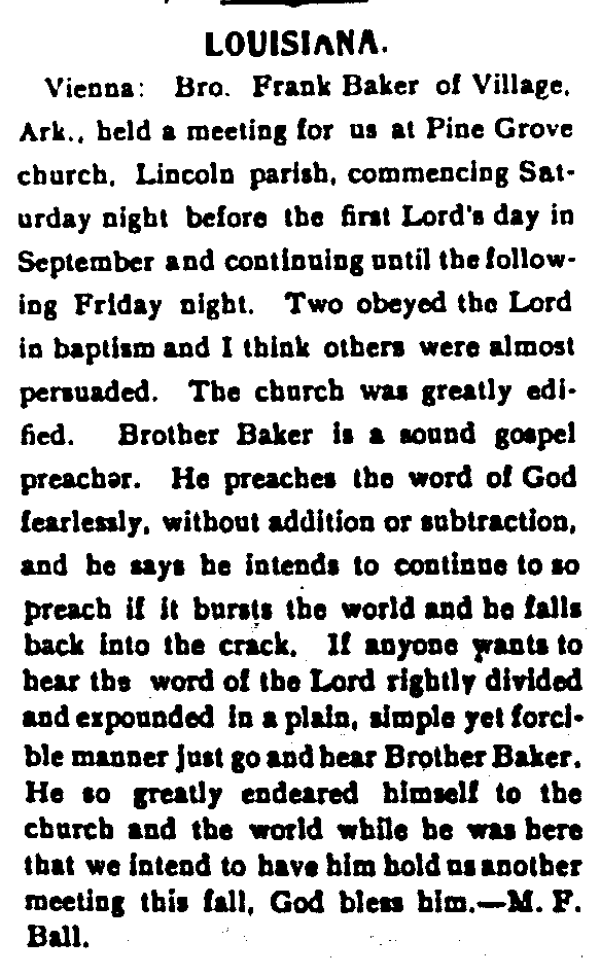
Firm Foundation-1899-10-03-p.642
After a couple years the Bakers moved to Navajo in the Oklahoma Territory to work. Reports of this were sent to the Gospel Advocate in 1902. They said of Frank that he "is one our our interested workers and is bringing forth fruit." (GA, 1902-04-03-p.421) By 1906 he was reported as preaching in Barnard, Missouri. In 1907 he was back home in Village, Arkansas. In 1909 the family moved down to Blanket in Brown County, Texas. The 1910 U.S. Census recorded that he was 37 years of age, that Lela was 28, with three children: Allie-10; Nay-8; and Horace-6.
While in Blanket he wrote to the Firm Foundation of a preaching trip to San Angelo several miles to his west. In a lengthy report he shared the following:
"On Saturday, January 15, I boarded the Frisco train at Blanket, Texas, for San Angelo. I reached my destination at 1:40 p.m., where I was met by our good Brothers S. A. Pitman and Wakefield. Soon after a hearty handshake we were on our way to the former's good Christian home, where we found Sister Pitman, the children and last, but not least by any means, a well prepared dinner waiting for us.
"After we had partaken of some of the good things of life, Brother Pitman and I went out in search of the brethren. The first to be found was our good Brother J. S. Dabney, who had many good things to tell us. After this I met quite a number of the faithful at San Angelo. On Lord's day morning, in company with brother Pitman and family, we made our way to Wall, a distance of ten miles, where a good number had come together to hear the word of God. I preached for them as best I could at eleven and half past three.
"Wall is where I assisted the few faithful in a meeting last July. Our meeting at that time was a success in the way of additions. They were all converts, not just simply additions. We now have some as fine Christians and strong in the faith at Wall as can be found in Texas. I promised to visit them again soon.
"We drove back to San Angelo after the afternoon services, that we might be with the faithful In San Angelo at their seven o'clock services, notwithstanding the fact that quite a lot of sickness was In the city and a good number of the members were kept away, yet when the hour for service came the house was well filled, and finding a good chance to preach I took advantage of the opportunity. I shall always remember my visit with this good, God-loving and God-fearing people.
"I am sure there is not a better congregation in the South than the San Angelo congregation. They are alive to the work and, how could they help It with such men as Brothers Shipman, Dabney, Sewell and others? This is the home of the good, grand and godly man, Jesse P. Sewell. This was my first time to meet him, but he impressed me with being one of the purest and best men of earth. He truly has the cause at heart.
"I am now at home arranging for work wherever it may be needed. I have spent the past three months in a drug store as clerk, owing to the fact that it seemed to be an idle time among the churches, having no desire to have work done at home or elsewhere, so, like Paul, I have been making tents. Yours in the one faith." -FRANK BAKER. (FF-1910-02-01-p.8)
By 1911 the family was back home in Village, Arkansas. During the summer he made a preaching trip to northwest Alabama. A report was sent from Flat Creek in Fayette County with the following, "Brother Frank Baker closed a meeting at this place last Lord's day, with nine additions. Brother Baker did some of the best preaching I have ever heard." (J. T. Vandever, GA-1911-09-21-p.1078). He went from there to Berry and preached. After his visit to Berry, he was in love with the place. The brethren invited him to come work with them. And, within a short time he was back at home in Arkansas with the news of a family move to Alabama. (GA-1911-12-28-p.1520)
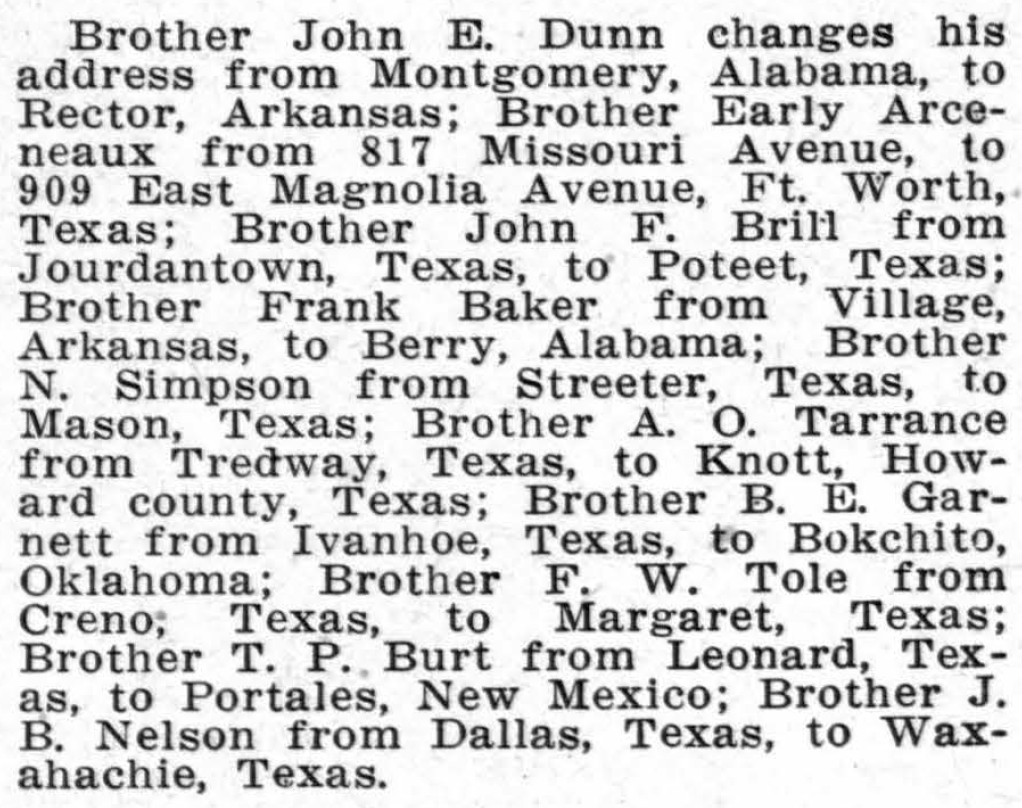
Firm Foundation, 1911-12-19-p.5
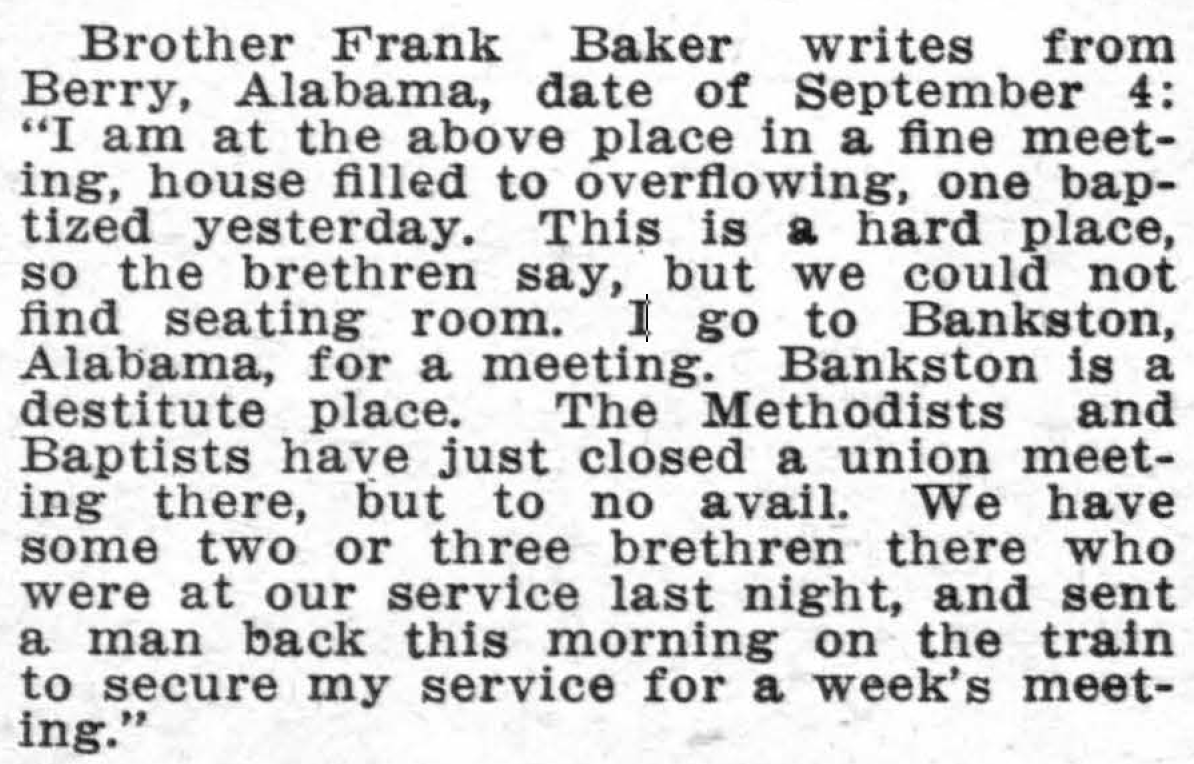
Firm Foundation-1911-09-12-p.5
After familiarizing himself with the needs of the area, he soon saw it promising to move over to Oakman in Walker, County. So, in 1912 they moved there and built a house. While in the region he preached not only for Oakman, but in Jasper, Cordova and anywhere else he was given the opportunity. With his busy schedule he still longed for the summers when he could travel and evangelize. He made trips into Tennessee, Kentucky, and back into the western states where he worked in earlier years of his ministry.
In early 1916 the Bakers moved to Belmont, Mississippi to work in that state. He soon was preaching in Tishomingo, Jacinto, and all over NE Mississippi. He did several preaching trips back into Louisiana, Texas and Arkansas.
The church in Berry was attempting to support a failing school as well as a congregation the needed help. Contacting brother Baker, in mid 1921 they moved back to Berry, Alabama. The Alabama Christian College there was being operated under the oversight of Hal P. McDonald. They built a house on the road that runs behind the church building, and at the end on the left. It was just across the street from a young preacher and student in the college, Gus Nichols. The Nichols and Bakers remains close friends and co-workers the remainder of his days.
The following year the school was abandoned by Hal P. McDonald, and the doors closed due to a lack of funds. Leaving for Jasper, Alabama, the preaching duties fell to Frank, Gus, and others of the former students continuing to live in the area. The church suffered greatly when the school closed. Yet, they continued to work all the more to preserve the congregation.
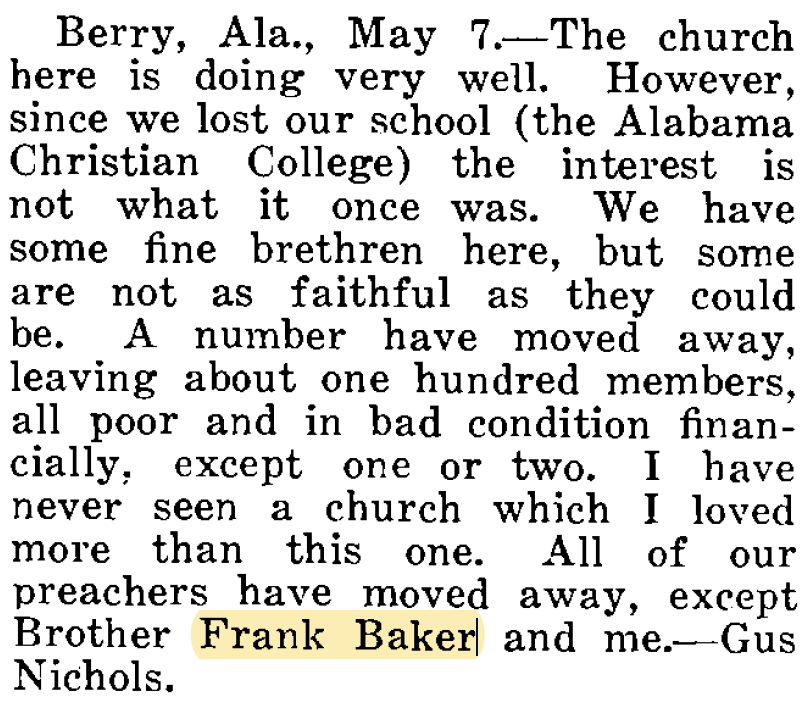
Gospel Advocate, 1923-05-17-p.494
In 1923 he made a preaching trip to central Florida where he preached in several meeting efforts. This was the first of other trips he determined to make. Later that year, he moderated for a debate between Charley Nichols, Gus' brother, and W. W. McMicken, an Adventist preacher.
In 1924 he wrote the following to the Advocate, "Since my last report I have preached at the following places on Lord's days: Berry, Bethel, Gorgas, Power Plant, Liberty Hill, and Flat Creek. The Lord willing, I will preach at Bankston. I have preached for all the above-named congregations at such times as I could for the past thirteen years. The Lord has many good people at all the above places. I have had to turn down many calls for meetings this summer, but I could not turn loose my work as salesman or clerk for a few summer meetings and then be out of work for the winter. Most congregations in this section think that a preacher should hibernate through the winter and then come out in July and August ready for the protracted-meeting season." (GA-1924-07-17-p.692) He later reported that the work at Gorgas was a new congregation he had planted. The Alabama Power Company had built a building for any of the denominations to use. So the Methodists, Baptist, and Church of Christ met in the building in rotation every three weeks. It was a hard work, but they brought in some of the great preachers of that day, C.R. Nichol and others.
In September, the town of Berry met for the purpose of electing a mayor. They determined to induce several people to run in an election to take place in the future. The first name to be raised was Frank Baker. After this, no other names were given by the crowd. As all seemed to be pleased, Baker was installed as mayor that day. It was the first time in the town's history that the mayor was a minister of the gospel.
His new responsibilities as mayor kept him busy six days a week, but when Sunday came, he was ready to preach two sermons at the local church of Christ. Several from the town had heard him preacher, but his new level of fame brought more attention. He served as mayor of Berry, Alabama for one year.
Never far from his thoughts was the need to go and preach the gospel. Florida had become a new favorite place, and so in 1925 he returned for another preaching trip there, and still another into south Alabama. These trips continued right into 1926. That summer while in Florida he had some health issues that demanded he leave the mission field and return to his Alabama home. In January the following year, a letter appeared appealing for help saying, "Frank Baker, of Berry, Ala., is suffering with high blood pressure and other complications, and his condition is such that he has been unable to earn a living since last summer. He will be confined to his room for several more months. Brother Baker is a sound gospel preacher, and brethren in more fortunate circumstances should contribute to his needs in this time of misfortune. I visited him some days ago, and know him to be worthy in every way." (F. O. Howell, of Jackson, Tenn., GA-1927-02-03-p.105)
In April, 1927 he made another trip to Florida for an extended stay. In July it was reported, "Rev. Frank Baker and family left Monday early for Cross City, Fla., where they will reside in the future. Rev. Baker has been an interesting resident of Berry for the last sixteen years. While here he has been instrumental in the building and maintaining of the Christian Denomination, having been a very influential man in the establishment of the Ala. Christian College and other pharses(sic) of religious activities here. He also served as the town mayor for one year. The town and Community will miss them and regret to have them leave." (Fayette Banner - 1927-07-07-p.3, Thursday)
When Frank's health did not improve, the family determined to go back to their home in Berry where he could rest. An article appearing in the Fayette Banner on September 8th expressed that since his return to Berry his health was improving. However, a week later, the paper reported, "The critical condition of Rev. Frank Baker, who has recently returned from Coss (sic) City, Fla., is considered very grave at this writing and little hope is held for his recovery. Rev. Baker seemingly upon his arrival here was improving and for several days was seen upon the streets, prior to this attack." (Fayette Banner - 1928-09-13-p.3, Thursday).
The following week the Banner reported under the title, "Rev. Baker Expresses Love For Friends," the following appeared, "Rev. Frank Baker expresses his heart felt love and gratitude to his host of friends who have been so faithful and untiring in their many beautiful deeds rendered him during his recent serious illness. Rev. Baker has been lingering for several months with high blood pressure, with hesulting(sic) complications. He has fought valiantly all along and on several occasions, life's flickering shadows have seemingly been gathered near but through the many efforts of loving hands and the goodness of God he seems to be steadily but slowly gaining ground, which is greatly hoped to be permanent. He wishes all his friends to know just how much their kind thoughtfulness is appreciated and not only by himself alone but his immediate family as well, and how pleasant his associations have been during his entire seventeen years as a citizen here. He is a lover of the youth of the country and is equally admired by them," (Fayette Banner - 1928-09-20-p.6, Thursday).
The newspaper for October 11th enclosed, "Rev. Frank Baker, who for the past few weeks has been confined to his bed, is again losing ground. His condition is rapidly on the decline and no hope whatever is held for him." (Fayette Banner - 1928-10-11-p.3, Thursday). Ten days later, the 21st, being attended by his loving wife, family, and close friends, the earthly life of Frank Baker came to an end.
On October 25th under the title, "In Memoriam, Rev. Frank Baker," the following appeared, "Deeply grieved at the death of Rev. Frank Baker, we his friends, take this method of expressing our sorrow and conveying to his family the assurance of our earnest sympathy and condolence. Brother Baker, the name by which he was pleasantly called, by his kindly acts and genial manner won the friendship and esteem of all who knew him. Ever courteous and considerate, he labored faithfully while with us in promoting the social and religious welfare of our town and community. Active and alert in every good work, the force and influence of his strong personality were readily given to every undertaking, seeking to advance moral interest and improvement. An intimate acquaintance with him revealed his many fine traits and qualities, and this testimonial is an evidence of our high regard and a generous tribute to his worth and merit. Actuated by noble incentive he exemplified the truth that, "A good name is to be chosen rather than great riches and loving favor rather than silver and gold," and by this, he conveys to his splendid sons the royal heritage of a good name and to his sorrowing wife and loved ones the consoling reflection that his life was such that he will ever be held in affectionate remembrance. (Signed.)—F. A. Gray, N. H. Kimbrell, H. M, Adcox, J. A. Brown, J. W. Shepherd, M. L. Chism, Fred W. Johnson, Dr. D. H. Wright, J. D. Walton, Theron Cannon, R. R. Jones, Mack Karrh, W. D. Utley, E. W. Hudson. (Fayette Banner - 1928-10-25-p.4, Thursday).
On November 1st, the family inserted the following under the title, "Cards Of Thanks." "We wish to give public expression of our gratitude for the countless favors extended us during the long and fatal illness of our husband and father, Frank Baker. Kindness, under all circumstances, is always prized and esteemed, but under the ordeal through which we have passed the thoughtful and constant courtesies shown us began a gratefulness that words cannot convey. Such acts cannot be repaid in human appreciation, but will receive their just reward in that Heavenly home where loving deeds will bejewel the crown of the pure and good. Again thanking our many friends for their helpful service and many manifestations of their love and interest, we are, Sincerely, Mrs. Frank Baker and family." (Fayette Banner - 1928-11-01-p.4 Fayette Banner - 1928-09-13-p.3, Thursday).
Thus came to an end the life of a great man. As always, the story doesn't end there. Not long after his death, Lela determined to move to West Virginia where her son was living. It was a small town without a sound church. She attempted to begin one in her home and even got the help of E. P. Watson in Huntington to come over and preach meetings. Reports appeared in the Gospel Advocate. Later, her life came to a close while out in Dallas, Texas with another of their children, on October 23, 1954. Her body was returned to the small Fayette county town of Berry and laid to rest next to that of her husband in the Berry City Cemetery.
-Scott Harp, 12.23.21
Sources: Fayette Banner, Fayette County, Alabama, Arkansas Angels, Gospel Preachers Who Blazed The Trail, Gospel Advocate, Firm Foundation, Newspapers.com, Ancestry.com
![]()
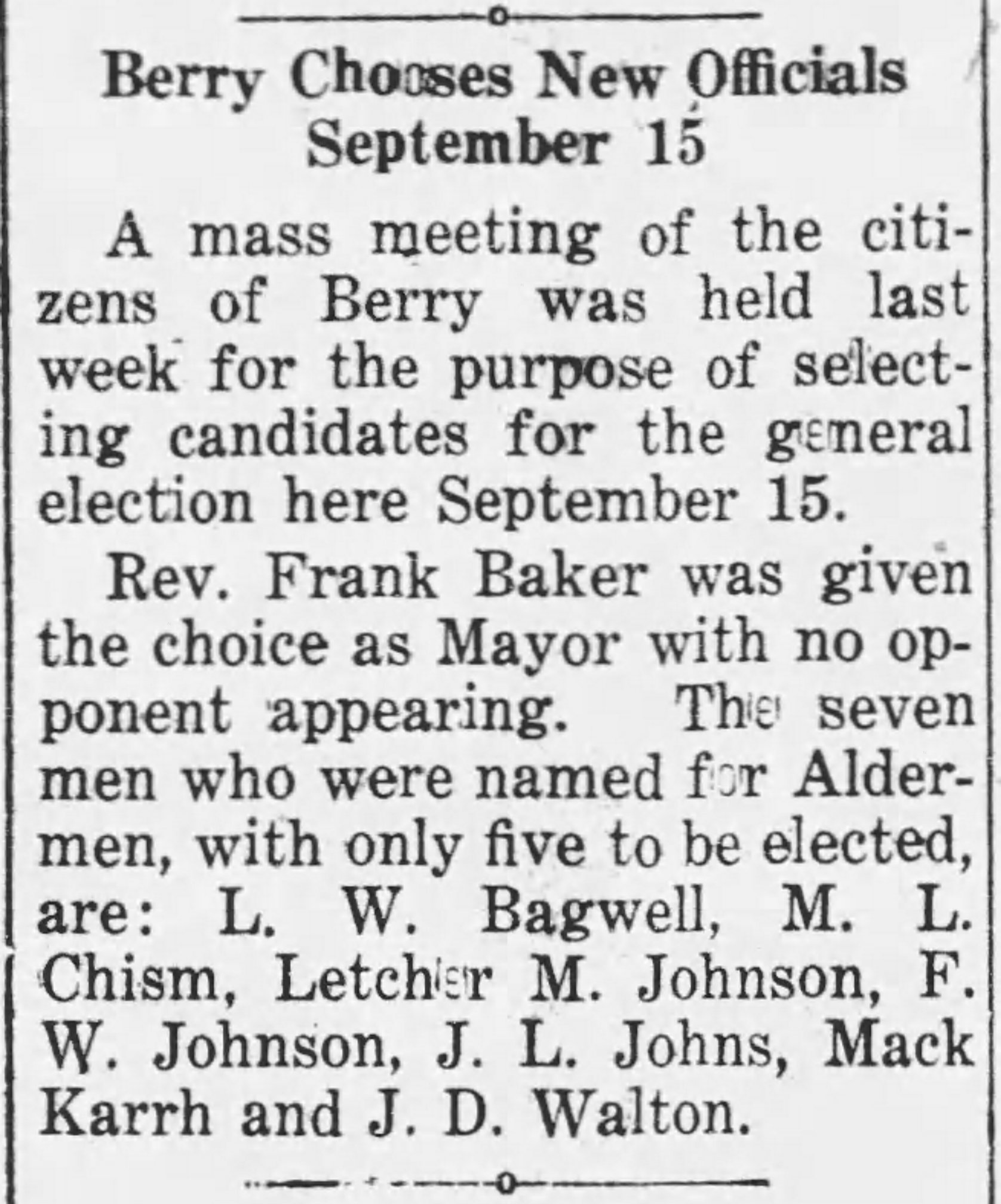
Fayette Banner, Fayette, Alabama
Thursday, September 11, 1924, p.4
![]()
Fayette Banner, Fayette, Alabama
Thursday, October 9, 1924, p.8
![]()
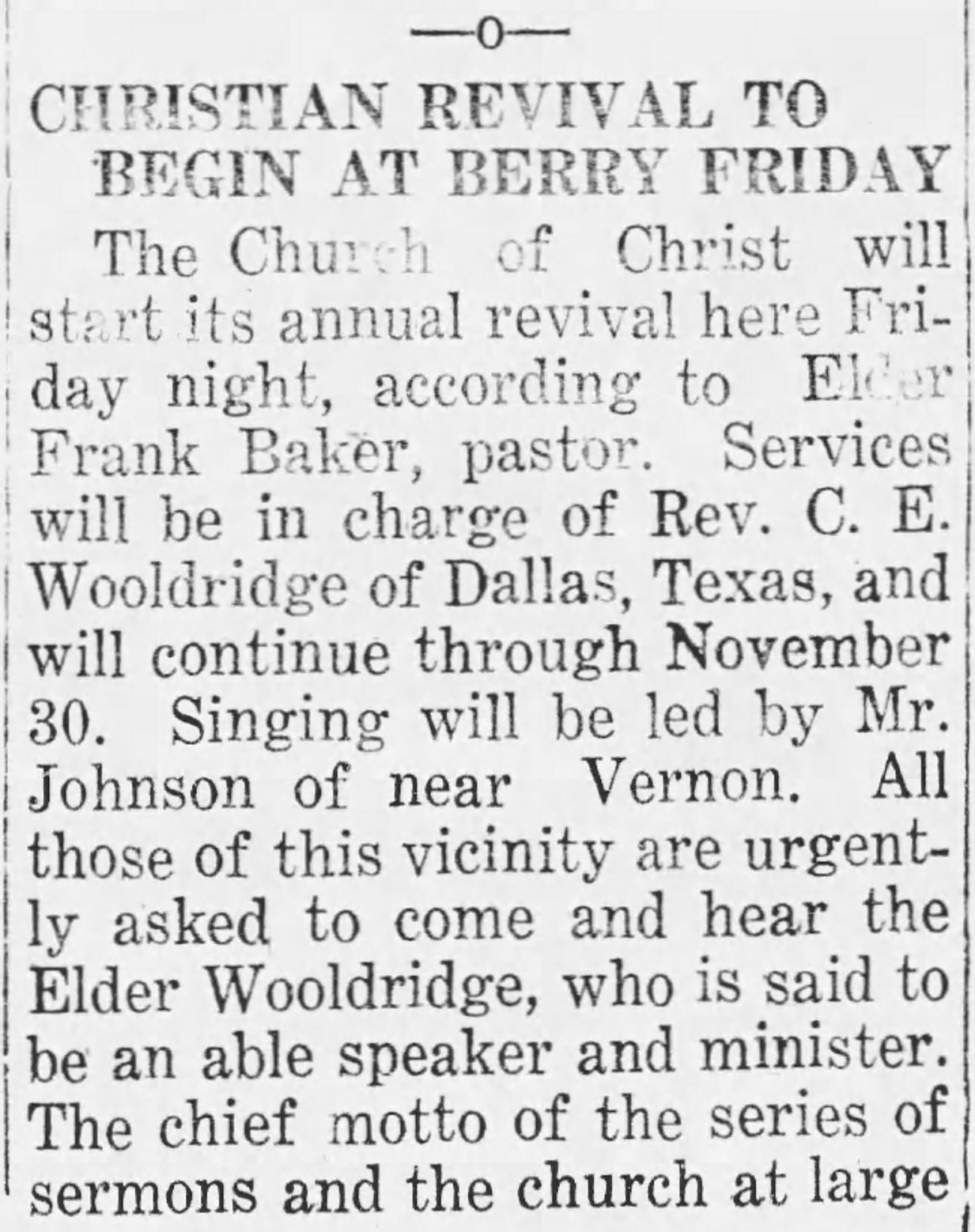

Fayette Banner, Fayette, Alabama
Thursday, November 19, 1925., p.3
![]()
Fayette Banner, Fayette, Alabama
Thursday, January 28, 1926, p.3
![]()
Obvious Slighting Of Character
Fayette Banner, Fayette, Alabama
Thursday, April 1, 1926, p.6
![]()
Fayette Banner, Fayette, Alabama
Thursday, April 21, 1927, p.6
![]()
Fayette Banner, Fayette, Alabama
Thursday, July 7, 1927, p.3
![]()
Fayette Banner, Fayette, Alabama
Thursday, September 6, 1928, p.7
![]()
Fayette Banner, Fayette, Alabama
Thursday, September 13, 1928, p.3
![]()
Fayette Banner, Fayette, Alabama
Thursday, September 20, 1928, p.6
![]()
Fayette Banner, Fayette, Alabama
Thursday, October 11, 1928, p.3
![]()
Fayette Banner, Fayette, Alabama
Thursday, October 25, 1928, p.4
![]()
Fayette Banner, Fayette, Alabama
Thursday, November 1, 1928, p.4
![]()
Directions To Grave
Frank and Lela Baker are buried in the Berry City Cemetery in Berry, Fayette Count, Alabama. There is no easy off access from an interstate to this town or cemetery. The easiest directions would probably come from accessing the grave location in the GPS info below. Otherwise, make your way to Berry, Alabama. Coming into town from the north on Hwy. 18, turn left on Homestead St. just before the High School. If you pass school you've gone too far. Head out Homestead St. and go to the second entrance on your left. Head to the rear of the cemetery and the Baker's monuments will be on the right. While there note the graves of J.C. and Estelle Shepherd. It is a large white monument at the very end, near the Baker's graves. They were great benefactors of the church of Christ and Alabama Christian College. Their old two-story mansion still stands across Fenton Street from the church of Christ.
GPS Location
33°39'49.4"N 87°35'42.1"W
or D.d. 33.663726,-87.595013
![]()
I visited this cemetery on a wet February morning in 2015
The Baker Monument does not face the drive. It is the red marble monument just behind the tall marker in the center above
Zoomed in pic from the road. The Bakers are the redish marble plot in center of picture above
Tall white monument in the rear is the Shepherd family plot. J.C. & Estelle Shepherd were great benefactors of Christian Education
![]()
Photos Taken 02.01.2015
Webpage produced 12.23.2021
Courtesy Of Scott Harp
www.TheRestorationMovement.com
![]()
